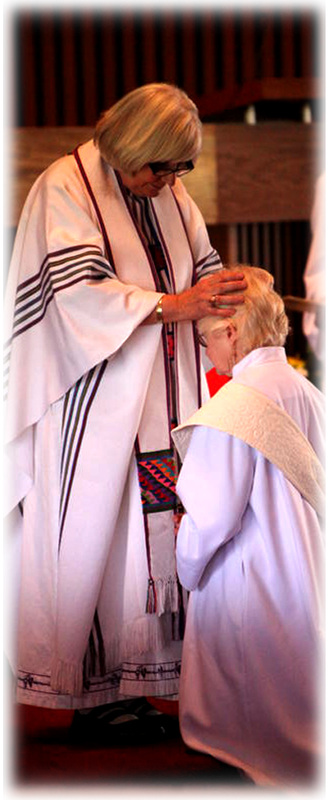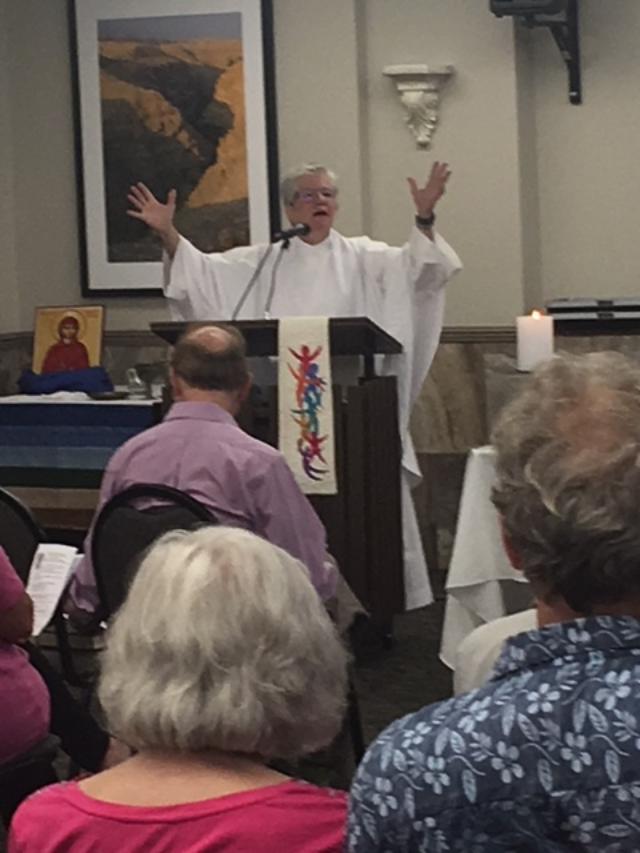6th Sunday of Easter
Maria Thornton McClain, RCWP
Albert Schweitzer once wrote: As for humankind today the realization of the Kingdom of God here on earth has become a matter of survival or extinction.
This afternoon we begin with a true story from the not too long ago of Apartheid in South Africa. As you know in those days laws prevented blacks and whites from mingling. When an official died who had worked within system to humanize life for the oppressed blacks, other officials refused to let black people in to the funeral.
The deceased official’s family had requested that black people be allowed to attend but they were refused. It was a real insult to them. A black pastor visited the white chief justice who the pastor believed to be a friend to the oppressed black people. The pastor invited the judge to participate in their Good Friday service that included the practice of washing each other’s feet. The judge agreed to attend and asked that no announcement be made before he arrived.
During the service the judge approached Martha, the person who had been a servant in his home and cared for his children. He came forward and washed and dried her feet. Then he took her feet and kissed both of them. That action that demonstrated God’s love had a ripple effect of setting in motion the end of apartheid.
That reminds me of the first Reading from Acts. Philip went to Samaria, of all places! Jews from Judea and Galilee didn’t do that. There was long-standing animosity between and Jews and Samaritans. Here was Philip on his first mission to bring the message of God’s love and the example Jesus gave of how to respond to it. How wonderful that the people heard Jesus’ message of inclusion and decided to take it to heart! Samaritans were ready to hear that challenge and respond to it, following Christ in their own area!
The judge in the Apartheid story had internalized Christ’s self-sacrificing love. His action spoke volumes to both white and black people around him. Jesus’ fundamental message through everything he said and did was the same. He even promised to send another advocate to stand up for them, like a defense attorney in a courtroom.
We all have that same advocate to guide us in the courtroom of our everyday lives. We have each other to help us be obedient to the call to love. We don’t have to worry if we are following God’s desire for us. Just put ourselves in God’s “hands.” …………… Sure, “just!” How many times have we all started out with the best of intentions, gotten scared and went back to our own merger resources which got us in trouble in the first place.
What better time to realize again that the Kingdom of God is within us, and realize that “us” refers to the loving family and friends, people in our faith community who are there for us. They will help or advise if we will just let them know our needs, without excuses like “Oh it’s nothing!” or “you’re too busy,” or ”it’s too far!” Will we speak in love to one close to us whom we believe has stepped outside the bounds of accepted behavior?
We middle class, white, privileged Americans have a hard time asking for help. We think we should do whatever we can by ourselves. What we really need are community and national and planetary needs. We can look around and pay attention to needs in our neighborhood and our church community. What about neighbors who are just learning English?
I guess Albert Schweitzer knew what he was talking about when he wrote: As for humankind today the realization of the Kingdom of God here on earth has become a matter of survival or extinction.
What are some ways you reach out in love without expecting anything in return?
Where do you meet Christ along the way?
The good Shepherd, Compassion and Climate Change Weekend
Maria Thornton McClain, RCWP
Yesterday, Nancy and I, along with a packed house at Clowes Memorial Hall, celebrated the ordination and consecration of Jennifer Baskerville-Bowens as the 11th Bishop of the Episcopal Diocese of Indianapolis. As part of the ceremony Bishop Kate Waynick, her predecessor, gave her the pastoral staff of the diocese, with these words: “On behalf of the people and clergy of the Diocese of Indianapolis, I give into your hands this pastoral staff. Walk in the footsteps of Christ the Good Shepherd as you carry it in his name.”
Today’s gospel compares Jesus sometimes to the Good Shepherd, sometimes to the gate through which the sheep go in and out in safety. In Jesus’ time the shepherd would sometimes be the person to stay by the gate all night to keep away those who would steal the sheep. There were times when the shepherd gave their life for those in their care.
What an example of compassion that is for each of us in our own roles! We here are all leaders in some way. Someone or someones are looking to us to be for them the example that gives them courage to follow their real path, freely accepting God’s self-communication. It takes dedication and focus to be attuned to other’s needs, like the Good Shepherd who can call each of the sheep by name and knows their needs. That dedication and focus comes from learning and following that guidance from God on a regular basis.
Like the sheep that know their shepherd and won’t follow anyone else,
we can choose to travel toward the light of Christ and get the message that is meant for each of us. That’s how we begin to get the ability to lead others in the way of truth and love. As the reading on Compassion tells us, that movement happens “within the context of freedom.”
What does that mean practically? I think “freedom is a “slippery” word. When I was teaching high school religion the kids used to talk about “freedom to find their own truth.” Basically it was an excuse to experiment with what felt good. Most of us have been there, done that – and have transcended that way of living in favor of activating true freedom through accepting the grace that God has given us through the choices we make.
The other night in the TV show “Survivor” a young woman just couldn’t do the task that everyone else on her team had done, but her teammates challenged and encouraged her until she believed in their belief in her and finished the challenge on her own. That life lesson will stay with her long after the memories of winning or losing the game of Survivor will have faded from her memory.
Helping someone pull through a difficult time is an example of what community members can do for each other. But it means that we need to take opportunities to get to know one another better, so we connect at deepening levels.
I’m reminded again of the celebration yesterday of the ordination and consecration of Bishop Jennifer Baskerville-Burrows. The genuine enthusiasm in Clowes Hall was infectious. To add to the already auspicious occasion, Bishop Jennifer is the first Episcopal woman bishop to succeed another in this country. She is the first Episcopal African-American bishop in the United States and, it is happening in Indiana.
The Episcopal Church will care for their new shepherd, as she will care for and lead them. She will empower them to grow in compassion after the example of Christ. Together they will more forward, transcending their faith-life as they know it today.
We can transcend where we are in our faith-life and be what we are called to be for the good of ourselves, our families, the people of our city, state and country, and all of life. The opportunity and challenge are in front of us. Let’s seize the day!
Now it’s your turn. What does it mean to you to lead others in the way of love within the context of your freedom to be your real self?
God of the Living
Maria Thornton McClain, RCWP
November 16, 2016
My grandparents were married for 64 years. They got married in 1913. They endured many hard times together—WWI, when my grandfather fought in France; the Great Depression; WWII, in which their 3 sons fought; and the rapid social and technological changes of the 20th century. For instance, when they were young, my grandparents used horses for transportation, and their family farms were pretty much self-sufficient. But by the time they were adults, the economy had become much more industrialized. They had to adapt to the automobile, the TV, the phone, the computer, and the urbanization of the rural areas they had grown up in. Plus they had the heartaches most families deal with—illnesses, lay-offs, a house fire. But Grandma and Grandpa had many years of happiness, as well, with their 5 children, and 38 grandchildren and great-grandchildren. They had to be really committed to each other and very adaptable to cope with that much change. They were a wonderful example of love and loyalty to all our family. Their unity helped them overcome the stresses in their lives.
Even the most dedicated of couples has the occasional conflict, and my grandparents had their share. In our Gospel today, Luke gives his account of a confrontation Jesus had in the Temple in Jerusalem. It occurs after the cleansing of the Temple episode, and is one of a series of subsequent run-ins Jesus had with the Temple hierarchy. Earlier in the chapter, Luke relates how the chief priests, scribes, and elders had challenged Jesus’ authority, how he answered back with the scathing parable of the wicked tenants, and then how he silenced the officials with his clever solution to their query about paying taxes. Now these officials are back to challenge Jesus again. They are trying to embarrass him and dilute his popularity with his followers, maybe even gather evidence for a future prosecution. They want him gone.
“They” is actually two groups. The Sadducees were a religious party who considered sacred only the Torah, the first 5 books of the Bible. They couldn’t see any specific mention of the resurrection of the dead in those 5 books, so they didn’t believe it existed. The Sadducees cooperated with the Roman occupiers of Palestine, and benefitted financially and politically. Life for them was good. The other group is the Pharisees, a less affluent party whose sacred literature included the Prophets and Psalms, in addition to the Torah, and who were pro-resurrection. Life for the Pharisees, and for most Jewish people back then, was not so good. The Roman occupation was brutal. They were loyal Jews, and believed God would stand by the promises made to them. But they could see that their political and financial situation was not likely to change any time soon. So they kept hope alive for the life after death. They’d read about it in Isaiah, where it said God would destroy death forever, and wipe away the tears from all faces. (Is 25:8) And in Hosea, where we read, “O Death, where are your plagues? O Sheol, where is your sting?” (Hos 13:14) That hope of salvation someday is what kept them going.
So, the Sadducees and Pharisees had different beliefs and normally didn’t get along, but in this story they were united in opposition to Jesus, after he’d called them out for their hypocrisy. This time, they challenge Jesus by bringing up levirate marriage. That’s what it’s called, this law, from Deuteronomy (Ch. 25) that states that if a husband dies childless, his brother owes it to him to marry his wife and give her a son, for the first husband’s legacy, and the mother’s financial support. The Sadducees believed the dead father would live on, so to speak, in his son. Then they added on six more dead husbands to their hypothetical question, in an effort to discredit both Jesus, and the resurrection belief.
But Jesus comes back with an explanation of resurrection life completely different from life on earth. In Luke’s version of this story, Jesus says that in the hereafter, marriage, and passing women from one man to the next like property, will not be necessary, because resurrected people are “like angels” and “cannot die anymore” so have no need of progeny or family support. They are children of God, children of the resurrection, united, not with just one person, as in marriage, but with God, and all others, forever!
The clincher is that Jesus proves his point by referring to the Torah itself. Demonstrating that he knows more about Exodus than even the Sadducees do, he cites the passage (Ch. 3) about Moses and the burning bush, where God claims the name, “The God of Abraham and Sarah, the God of Isaac and Rebekah, and the God of Jacob and Leah.” Jesus says God is the God of the living, so somehow these forefathers and foremothers must still be alive to God. The Jewish officials are again speechless, and go away amazed by Jesus’ insight.
To Jesus and his followers, the resurrection represents the Second Coming, the Parousia, that already-but-not-yet time when justice will reign for everyone. This Realm of God, this time of God’s justice, was what Jesus came to both foretell and initiate. Some people think this Apocalypse will happen with a blast of the trumpet, and angels descending to earth, in a cataclysmic event like we read about in the Book of Revelation (8-11). Other people think we begin to glimpse moments of this time of God’s truth little by little while we’re still on this Earth. I agree with the latter group, and I think we experience this resurrection preview at transformative moments in our lives, when we’re most open to it. Like when we commit ourselves to someone, when we ask forgiveness, or when we extend authentic generosity. We perceive a flash of what eternity with God will be like when we look around at a strongly united group, when we pull together as a team, when we hold a newborn baby. We feel it when we converge on the altar at Mass to commune with God and one another, and unite with Jesus by consuming his resurrected Body and Blood.
When we read this passage at Mass, we join the Sadducees in asking, “Is there really life after death? Is there more than this life on Earth to look forward to?” And Jesus gives us a resounding “YES!” Yes, life with God for eternity does exist. Yes, one day the discrimination and pain and poverty and abuse will end. And yes, we can help to bring it to an end here in this life, little by little. We can begin to bring the moment of God’s truth here and now by living in love. God works through us when we do things like: fight for just treatment for prisoners and refugees; when we help to elect conscientious government leaders; when we work to get fresh produce into the food deserts in our city. We can even work on getting the Catholic Church to recognize women as human beings, as deserving of decision-making positions as men are. Hopefully our bishops will get that message when they receive the “ballots” we signed at our Equali-Tea on Thursday. God brings the time of justice to earth through us in these kinds of efforts.
I remember stories my grandparents told of feeding homeless travelers who would come to their door during the Depression. They could always at least come up with a sandwich and a cup of coffee. Later, I remember my grandfather doing free house repairs for their neighbors, fixing leaky faucets, replacing broken window glass. And he and Grandma always put out a much bigger garden than they needed, just so they could keep those same neighbors supplied with fresh vegetables. No, there was no food desert while Grandma and Grandpa were around. They were always helping somebody, quietly, without making a fuss. They’d been blessed with good health and a big family, now they believed God expected them to share. They let their love for God and one another spread to everyone around them.
Those of us who have felt that kind of unity with at least one other person in life, have known moments, glimpses, of the resurrection experience. If that kind of unity is achievable here on earth, think what it will be like when we are one with God in all. My grandparents know it now, I’m sure. They shared a few glimpses of that love and oneness while they were here with us, and they did their best to make it grow. Now it’s up to us. Now it’s our turn to keep the faith, and look for the resurrection.
Helen Weber-McReynolds
Introduction to Preaching
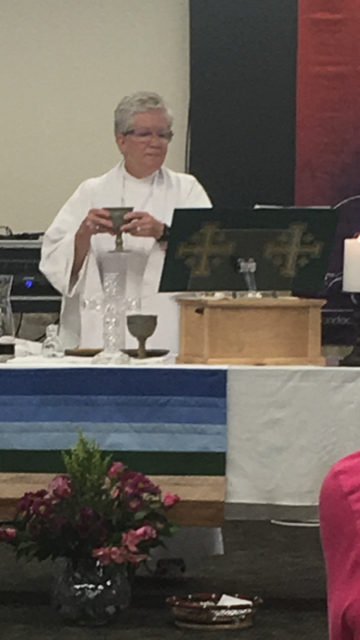
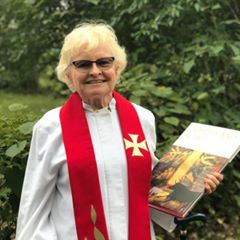
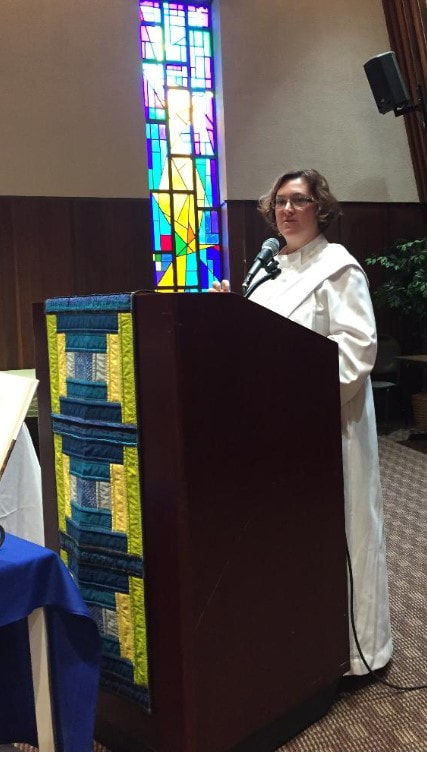
 RSS Feed
RSS Feed
